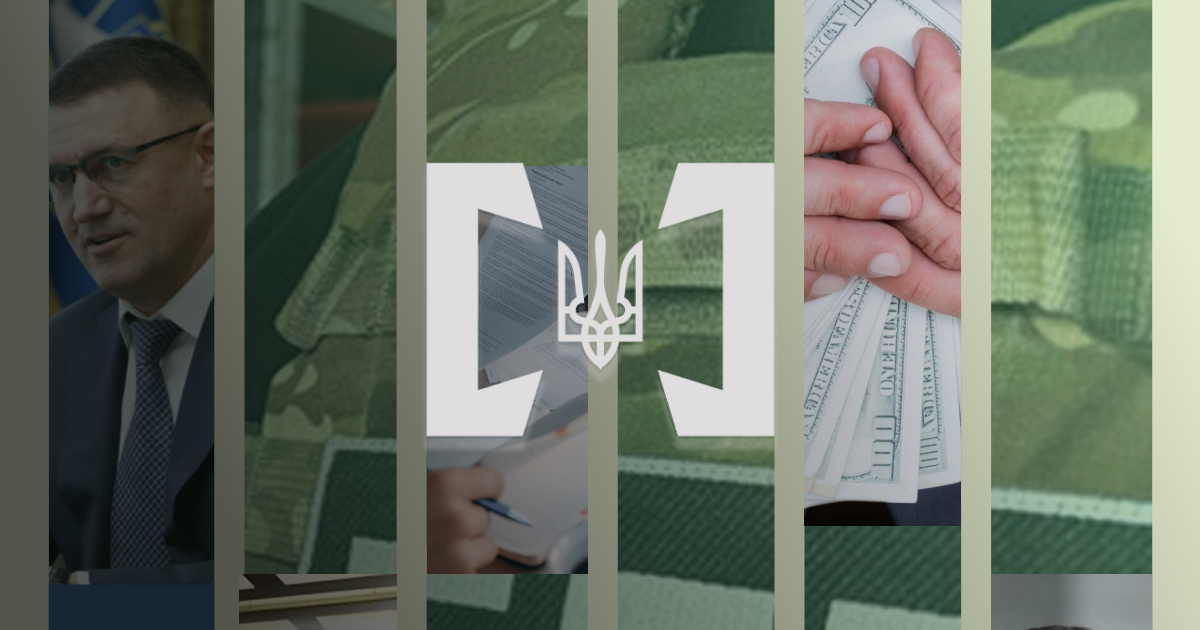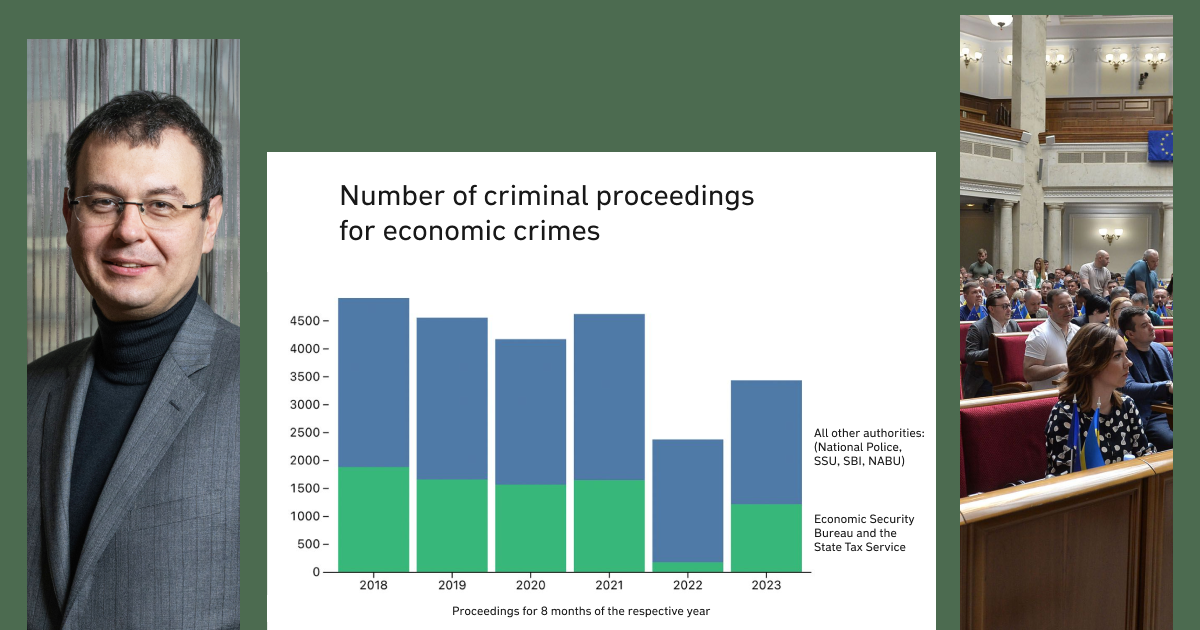Economic Security Bureau. Fighting for reform

The website of the Economic Security Bureau states its vision: "The ESB is an independent, effective, competent authority that ensures the economic security of the state and enjoys the trust of society, business and international partners."
Over the years, the Bureau has only moved further away from achieving its vision. Businesses complain about pressure, international partners are waiting for reform, and there is a political confrontation in government circles over what this reform should look like.
The Economic Security Bureau was created in November 2021 to investigate economic crimes in Ukraine: tax evasion, organisation of financial transactions, smuggling or illegal business. Previously, the tax police and other law enforcement agencies were responsible for this.
Based on the results of the competition, Vadym Melnyk became the head of the Bureau. He emphasised that the ESB was not a law enforcement agency but a fully analytical body and that the Bureau would be the only one to deal with criminal manifestations in the economy.
The reform failed. 80% of the Bureau's employees used to work for the tax police, and the ESB replaced it. The team brought old approaches and pressure on business to the new body. At the same time, the ESB did not become the only body to deal with economic crimes.

Within a year of the ESB's operation, the Verkhovna Rada set up a Temporary Commission of Inquiry to investigate possible violations by the body's management. In May 2023, the head of the Commission, MP Yaroslav Zhelezniak of the Holos (Voice) party, reported to the Verkhovna Rada on the results of the investigation:
- Competitions for positions at the ESB were held with significant violations;
- The ESB ineffectively performs its analytical function and counteracts economic offences;
- The ESB shows "extremely low" results of pre-trial investigations of criminal proceedings.
The Verkhovna Rada Committee on Finance, Taxation and Customs Policy found the work of the ESB management unsatisfactory. Two months later, Vadym Melnyk, also a former tax police officer, resigned as head of the ESB.
Melnyk's first deputy, Eduard Fedorov, became the interim acting director. Bihus.info investigative journalists found out that Fedorov's relatives have various businesses and property registered in their names. For example, his mother owned a motorbike worth about USD 25,000. After the full-scale invasion began, Fedorov bought a Tesla car and continued to build a hotel complex with his former Security Service of Ukraine colleagues.

Since August 2023, the interim head of the ESB has been Andrii Pashchuk, who worked in law enforcement (1997-2017) and the National Security and Defense Council Secretariat (2019-2022) and was head of analytics at the ESB. In an interview with Forbes Ukraine, Pashchuk complains about the underfunding of the ESB. He says that in 2024, the Bureau needs UAH 4.5 billion (about USD 116 million) to fully staff it (3,000-3,500 people) and implement a unified analytical system.
Efficiency = pressure on business?
Andrii Pashchuk also says that in 2023, the ESB significantly increased its efficiency. Reports on the ESB website show this. In the first six months of 2023, the number of criminal proceedings sent to court was almost five times higher than in 2022 — 137 versus 29. The ESB says that in 2022, it identified risks of losing UAH 26.3 billion (about USD 700 million) from the state budget, and in the first six months of 2023 — UAH 171.6 billion (about USD 455 million).
As the ESB's efficiency increases, the number of complaints to the Business Ombudsman Council of Ukraine is growing — 1,336 complaints in 2023 compared to 521 in 2022. The majority of complaints are related to tax issues or actions of law enforcement agencies. Svidomi sent a request to the Business Ombudsman Council to clarify how many of the complaints relate to the ESB's work. We haven’t received any response since the publication.

At the beginning of the full-scale invasion, the Verkhovna Rada adopted changes that were supposed to facilitate business operations: taxation cuts and exemption from fines for late payment. It was necessary to ensure that the economy remained stable during the war.
The Multiplex cinema network took advantage of this deferment of the payment of taxes. In February 2023, the ESB opened a case against the company for tax evasion. Multiplex CEO in Ukraine, Roman Romanchuk, told Interfax-Ukraine that the unified social tax debt was incurred in 2022: the cinemas were closed, so the company took advantage of the new legislation. Romanchuk said that the ESB opened the case on February 22, 2023, when the company had already finished paying off debts accumulated at the beginning of the war. At the end of 2023, the ESB closed the case against Multiplex, but the company suffered reputational damage.
ESB reform
In early 2024, Volodymyr Zelenskyy announced the creation of an Entrepreneurship Support Council to engage in dialogue with businesses and combat pressure on entrepreneurs. This decision was made after the arrest of Ihor Mazepa, CEO of the Ukrainian investment company Concorde Capital. The business community interpreted this as pressure.

Back then, Zelenskyy promised the government would present a plan to reform the Economic Security Bureau. Rebooting the ESB is one of the commitments Ukraine has agreed to with the International Monetary Fund. The European Commission has noted that the ESB lacks accountability and transparent selection of its leadership.
The government prepared a reform bill, but business associations and international partners opposed it. Instead, they supported an alternative draft law prepared by MPs led by Yaroslav Zhelezniak.
The main difference between the two documents:
- The composition of the competition commission to select the head of the ESB: the government proposes a commission of three Ukrainian and three international experts. In comparison, MPs offer three Ukrainian and four international experts.
- Re-certification of all ESB employees: the government proposes to do this a year after the end of martial law, MPs — after the election of a new ESB head.
Source: Ukrainian Business Council
On February 21, the Verkhovna Rada Committee on Finance, Taxation and Customs Policy held a meeting where Minister of Justice of Ukraine Denys Maliuska presented the government's draft law on ESB reform. Once the committee approves the draft law, they send it to the parliamentary session hall for a vote on its adoption.
The Committee then supported the government's draft law. Denys Maliuska promised to improve it for the second reading. The minister wrote that "it is customary for gentlemen to trust each other's word", but MPs did not believe him. The Verkhovna Rada fell four votes short of passing the bill.
Yaroslav Zhelezniak has repeatedly named Oleh Tatarov, deputy head of the Presidential Office, as the author of the government's draft law. Olena Shcherban, deputy executive director of the Anti-Corruption Action Centre, also claims that the ESB is to remain under the control of the Presidential Administration. She gives an example of why this is beneficial:
"The ESB handed over a suspicion to [oligarch Ihor] Kolomoisky, and he is now in jail. However, the ESB served this suspicion only to get ahead of the National Anti-Corruption Bureau and the Specialised Anti-Corruption Prosecutor's Office. It was done in order to take Kolomoisky under their "guardianship" where he would not be able to give out any information to independent law enforcement agencies. They used the ESB to hide Kolomoisky, not to convict or bring him to justice," says Shcherban.
In an interview with NV news outlet, the first head of the ESB, Vadym Melnyk, said that "there is no communication with the President's Office at all."
The ESB reform still needs to be carried out. The reboot of the body should begin no later than the end of June 2024.
Currently, the government's draft law has been sent back for revision, while an alternative one has not been adopted by the relevant VRU Committee.

The Verkhovna Rada needs to reform the Economic Security Bureau. Any opportunities for government agencies to put pressure on business must be blocked. I really want the law to be voted on in the near future. Everyone is waiting,
Volodymyr Zelenskyy said on February 26 during his speech at the Made in Ukraine forum.


